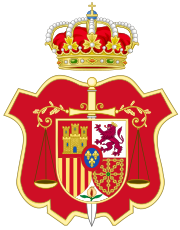CGPJ
| General Council of the Judiciary | |
|---|---|
 |
|
| Established | 1978 |
| Country | Spain |
| Location | Madrid |
| Composition method | Members elected by the Congress and the Senate and appointed by the King. |
| Authorized by | Spanish Constitution |
| Judge term length | 5 years |
| No. of positions | 20 |
| Website | www |
| President of the Supreme Court and the GCJ |
|
| Currently | Carlos Lesmes Serrano |
| Since | December 11, 2013 |
The General Council of the Judiciary (GCJ) (Spanish: Consejo General del Poder Judicial, (CGPJ) is the constitutional body that governs all the Judiciary of Spain, such as courts, and judges, as it is established by the Spanish Constitution of 1978, article 122 and developed by the Organic Law 6/1985 of the Judicial Power (LOPJ). The President of the CGJP is also the president of the Supreme Court.
The Constitution of 1978 regulates the General Council of the Judiciary in paragraphs 2 and 3 of the section 122.
2. The General Council of the Judicial Power is its governing body. An organic act shall lay down its status and the system of incompatibilities applicable to its members and their functions, especially in connection with appointments, promotions, inspection and the disciplinary system.
3. The General Council of the Judicial Power shall consist of the President of the Supreme Court, who shall preside it, and of twenty members appointed by the King for a five-year period, of which twelve shall be judges and magistrates of all judicial categories, under the terms provided for by the organic act; four nominated by the Congress and four by the Senate, elected in both cases by three-fifths of their members amongst lawyers and other jurists of acknowledged competence with more than fifteen years of professional practice.
This means that, the Constitution only detail the way of election of the eight members of the GCJ that they will be chosen between the most renowned jurists. It requires a minimum of 15 years of experience. Four of them must to be chosen by the Congress and the other four by the Senate. Both case requires a majority of three fourths of the members of every Chamber to be elected member of the GCJ.
Otherwise, for the election of the twelve members precedents of the judiciary, with independence of the professional category that they belong (Magistrate of the Supreme Court, Magistrate or Judge), the Constitution refers to what is established in a future Organic Law. The Cortes fulfilled this constitutional mandate with the approval of the Organic Law 6/1985, of 1 July, of the Judicial Power.
...
Wikipedia
